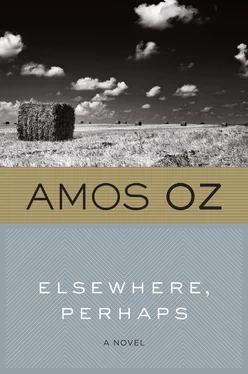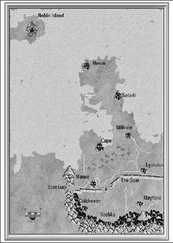Amos Oz - Elsewhere, Perhaps
Здесь есть возможность читать онлайн «Amos Oz - Elsewhere, Perhaps» весь текст электронной книги совершенно бесплатно (целиком полную версию без сокращений). В некоторых случаях можно слушать аудио, скачать через торрент в формате fb2 и присутствует краткое содержание. Год выпуска: 1985, Издательство: Mariner Books, Жанр: Современная проза, на английском языке. Описание произведения, (предисловие) а так же отзывы посетителей доступны на портале библиотеки ЛибКат.
- Название:Elsewhere, Perhaps
- Автор:
- Издательство:Mariner Books
- Жанр:
- Год:1985
- ISBN:нет данных
- Рейтинг книги:4 / 5. Голосов: 1
-
Избранное:Добавить в избранное
- Отзывы:
-
Ваша оценка:
- 80
- 1
- 2
- 3
- 4
- 5
Elsewhere, Perhaps: краткое содержание, описание и аннотация
Предлагаем к чтению аннотацию, описание, краткое содержание или предисловие (зависит от того, что написал сам автор книги «Elsewhere, Perhaps»). Если вы не нашли необходимую информацию о книге — напишите в комментариях, мы постараемся отыскать её.
Elsewhere, Perhaps — читать онлайн бесплатно полную книгу (весь текст) целиком
Ниже представлен текст книги, разбитый по страницам. Система сохранения места последней прочитанной страницы, позволяет с удобством читать онлайн бесплатно книгу «Elsewhere, Perhaps», без необходимости каждый раз заново искать на чём Вы остановились. Поставьте закладку, и сможете в любой момент перейти на страницу, на которой закончили чтение.
Интервал:
Закладка:
Noga Harish kept up her stand. The kibbutz was up in arms. All except Herbert Segal, his eyes hidden behind his round tinted spectacles, who repeatedly stated to the education committee: we mustn't destroy her. But at the moment there was nobody else who would accept his opinion.
Reuven Harish — incredible to relate — called on Ezra Berger. He found him in the garage at a surprising time: six o'clock on a Saturday morning. They stood face to face, not looking at one another. Reuven muttered:
"I, er… I happened to be passing."
Ezra stammered:
"The fuel supply is blocked. That is, I thought it was. I opened the hood and…"
Reuven considered, then suddenly frowned and said, in a strange voice:
"What's going to happen? Tell me. What's going to happen?"
And Ezra, his face deathly pale:
"I… I've begged her. Pleaded with her. What more can I…"
Reuven, oddly calm, asked:
"How… How could you… How could you have…"
Ezra said nothing. Suddenly, as if neither of them had spoken, as if they had not even seen each other, he rolled underneath the truck and started fiddling furiously with the engine, covering himself with black oil in his frenzy. As if Reuven Harish were not there. As if he did not exist.
Reuven left.
***
Bronka went to Noga's room. She spoke to her at some length. She said she was speaking to her just as she would have spoken to her own daughter, if she had had a daughter. She had always dreamed of having a daughter. From now on, if Noga wanted it, they would be mother and daughter. Time would heal everything. Time and love. It would be as if nothing had happened. From now on everything would change. Even between her and Reuven. "You're not to blame, Noga dear. How you're suffering, how you suffered, and I never knew. I'm to blame for everything. But now it'll all be different. If you'll only realize that…"
And Noga, when she had been speaking for a long time, wearily:
"Listen, Bronka, I'll need an older woman to help me when the time comes. You know what I think? I think you could be the woman. I think I want you to be the woman. Will you help me in… in a few months' time?"
"But Noga, dear…"
"Will you? Will you?"
Zechariah-Siegfried Berger had been to Tel Aviv on business and also made a trip to Jerusalem to see his brother Nehemiah. He had not stayed long; he had hurried back to the valley, to Metsudat Ram, because his other dear brother was in trouble. How could he not hurry back to help him? But if you'll listen to my humble advice, Ezra, it's better for you not to get mixed up in the business. That is to say, it's better for us if she does what she wants. Seen objectively, it's not a disaster. A peasant girl is going to have a bastard child, that's all. It's happened before, to thousands of girls in thousands of villages. And from the subjective point of view, dear brother, we derive a clear advantage. The community will reject the miscreant, and she will disappear for good, together with her baby. Maybe her father will go after her. Leave the financial side to your brother Zechariah. The money won't make any difference to me. I'm not thinking of her but of us. We'll get out of our difficulty and heal the rift in the family. A man must do everything he can for his family. And my family, brother dear, is you and Bronka and Tomer and Einav and dear little Danny and Oren and our brother Nehemiah. I'm a lonely man, Ezra. I haven't got a soul in the world except for my family. I want us to be happy. And our happiness will be complete when the little whore and her bastard are thrown out of here. Then, my dear Ezra, we shall return to our senses and be a happy family again. You and Bronka and your children and grandchildren, like olive shoots round your table, as the saying goes. Yes."
To Noga Harish Siegfried addressed different words. You must stand firm to the last. You're an intelligent girl. Don't be ruled by those sheeplike gossips. Respond to the call of the blood. Not a soul of Israel may be killed, because to kill one Jewish soul is tantamount to killing the whole of mankind. Even if that soul is still a fetus. You must bring the life that is taking shape within you into the world, because there is no joy like the joy of motherhood. What's more, to stand alone and proud against the hostility of the mass is the finest and noblest stance there is. By the way, that is what your mother thinks, too. I wrote to her and asked her what she felt about it. She feels as you do. Your mother loves you deeply, and she prays every day that you won't hate her. You can trust me. I'm her close friend and confidant in her new home. But that's not the main point. The main point, my sweetheart, is this: you must come with me, with your dear uncle Zechariah, to your mother. To your mother's house. There are forests and lakes there, and golden leaves and low gray clouds, and green dreaming hills. Calm death dwells there, and we are in his arms. There your child will be born. You will belong there. You don't belong here, dearest. You must come with me to your mother. You don't belong here. You belong with us. You're one of us.
26. A WINTRY TYPE OF PERSON
Zechariah-Siegfried Berger concluded his business in Tel Aviv. In the course of three or four days he signed on a troupe of dancers who danced Biblical dances, shepherds' dances, and pioneers' dances, and also a poetess who wrote in the language of the future, a daring patchwork of words from different languages, selected for their sound rather than their sense. She would read — or, more accurately, perform — her poems for Siegfried's clientele.
He also found three beautiful girls who neither sang nor acted, but they were fair-haired and pale-eyed and powerfully built. He signed them on to appear in khaki uniforms in his cabaret in Munich. They would be armed with submachine guns and portray scenes from the life of the Israeli fighting woman, such as the capture of a fort or the interrogation of a captured Arab officer.
Anyone who wants to succeed in the entertainment business, Zechariah said to Noga, who stared fixedly at his tiny mustache, must understand secret urges and hidden desires. If I am to stand up to the competition of my professional rivals and attract the public into my den, I must aim at the depths. I'm no match for Munich with clowns and acrobats and strippers. But if I bring along a subtle excitement, then I can bowl Munich over. The son of a murdered Jewish cantor takes Munich by storm, Noga my sweetest — you can't conceive of the poignancy of it. Imagine: a girl, a Jewish girl, a pretty, well-built Jewish girl standing on a suggestively lit stage, holding a submachine gun and trampling on an enemy soldier in a torn uniform who writhes and grovels and kisses her feet. It'll send them wild.
Zechariah concluded his business in Tel Aviv in time to pay a visit to our ancient and holy capital city, to see his beloved and erudite brother Nehemiah. The visit was not a success. The brothers began by exchanging memories. The memories upset them. They turned to present-day national problems and promptly quarreled. Nehemiah suspected his visitor of praising Jewish socialism in a mocking tone. He lost his temper and voiced his suspicions aloud. Zechariah was deeply hurt and answered bitterly:
"I love socialism and I love Judaism and I hold myself to be a zealous humanist. But if brothers stop believing what their brothers are saying, then the whole world reverts to chaos. Just think of Cain and Abel."
Nehemiah replied that the world reverted to chaos because of nihilism. As he spoke he smiled, as if to say, "I'm dropping a hint."
Zechariah agreed at once. He even repeated his brother's remark word for word. Then they discussed Ezra and reflected together on the complicated family situation. They both came to the conclusion that the purity of the family is the most important thing, both for the individual and for society. Zechariah explained that he was thinking of persuading the girl to go to Germany with him, to her mother. She had made up her mind to have the child. The social position of the child would be very awkward. He couldn't live at Metsudat Ram, whereas in Germany, of course, the atmosphere was completely different. He himself would handle the formalities and the other troublesome details for the sake of our dear brother Ezra's happiness.
Читать дальшеИнтервал:
Закладка:
Похожие книги на «Elsewhere, Perhaps»
Представляем Вашему вниманию похожие книги на «Elsewhere, Perhaps» списком для выбора. Мы отобрали схожую по названию и смыслу литературу в надежде предоставить читателям больше вариантов отыскать новые, интересные, ещё непрочитанные произведения.
Обсуждение, отзывы о книге «Elsewhere, Perhaps» и просто собственные мнения читателей. Оставьте ваши комментарии, напишите, что Вы думаете о произведении, его смысле или главных героях. Укажите что конкретно понравилось, а что нет, и почему Вы так считаете.












